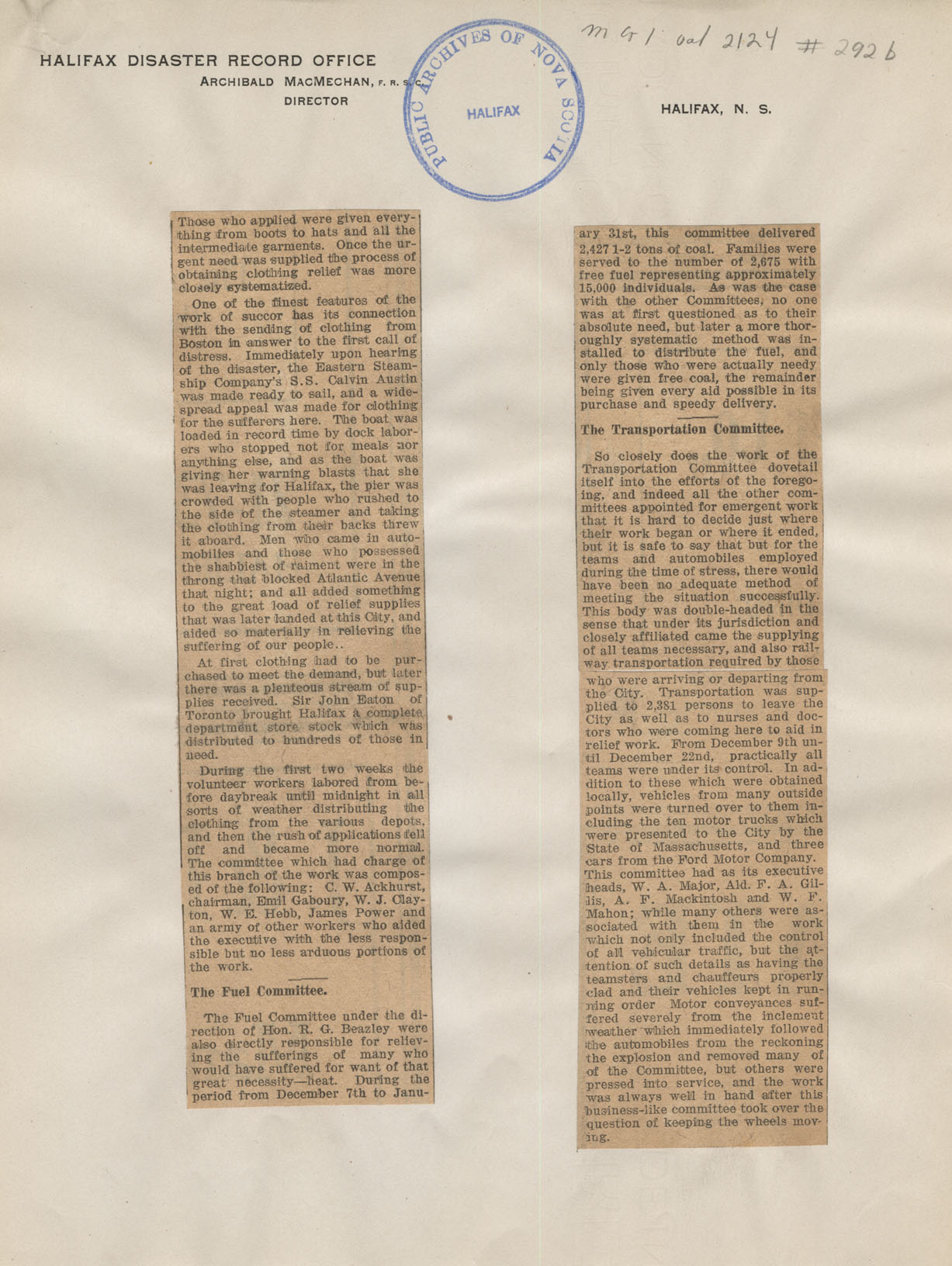Nova Scotia Archives
Archibald MacMechan
Halifax Disaster Record Office Materials
"First Great Restoration Work" was done by Noble Band of Volunteers
5 pages : 30 x 40 cm.
note: transcription publicly contributed - please contact us with comments, errors or omisions
HALIFAX DISASTER RECORD OFFICE
ARCHIBALD MACMECHAN, F.R.S.C.
DIRECTOR
HALIFAX, N. S.
Those who applied were given everything from boots to hats and all the intermediate garments. Once the urgent need was supplied the process of obtaining clothing relief was more closely systematized.
One of the finest features of the work of succor has its connection with the sending of clothing from Boston in answer to the first call of distress. Immediately upon hearing of the disaster, the Eastern Steamship Company's S.S. Calvin Austin was made ready to sail, and a widespread appeal was made for clothing for the sufferers here. The boat was loaded in record time by dock laborers who stopped not for meals nor anything else, and as the boat was giving her warning blasts that she was leaving for Halifax, the pier was crowded with people who rushed to the side of the steamer and taking the clothing from their backs threw it aboard. Men who came in automobilies and those who possessed the shabbiest of raiment were in the throng that blocked Atlantic Avenue that night; and all added something to the great load of relief supplies that was later landed at this City, and aided so materially in relieving the suffering of our people..
At first clothing had to be purchased to meet the demand, but later there was a plenteous stream of supplies received. Sir John Eaton of Toronto brought Halifax a complete department store stock which was distributed to hundreds of those in need.
During the first two weeks the volunteer workers labored from before daybreak until midnight in all sorts of weather distributing the clothing from the various depots, and then the rush of applications fell off and became more normal. The committee which had charge of this branch of the work was composed of the following: C. W. Ackhurst, chairman, Emil Gaboury, W. J. Clayton, W. E. Hebb, James Power and an army of other workers who aided the executive with the less responsible but no less arduous portions of the work.
The Fuel Committee.
The Fuel Committee under the direction of Hon. R. G. Beazley were also directly responsible for relieving the sufferings of many who would have suffered for want of that great necessity-heat. During the period from December 7th to January 31st, this committee delivered 2,427 1-2 tons of coal. Families were served to the number of 2,675 with free fuel representing approximately 15,000 individuals. As was the case with the other Committees, no one was at first questioned as to their absolute need, but later a more thoroughly systematic method was installed to distribute the fuel, and only those who were actually needy were given free coal, the remainder being given every aid possible in its purchase and speedy delivery.
The Transportation Committee.
So closely does the work of the Transportation Committee dovetail itself into the efforts of the foregoing, and indeed all the other committees appointed for emergent work that it is hard to decide just where their work began or where it ended, but it is safe to say that but for the teams and automobiles employed during the time of stress, there would have been no adequate method of meeting the situation successfully. This body was double-headed in the sense that under its jurisdiction and closely affiliated came the supplying of all teams necessary, and also railway transportation required by those who were arriving or departing from the City. Transportation was supplied to 2,381 persons to leave the City as well as to nurses and doctors who were coming here to aid in relief work. From December 9th until December 22nd, practically all teams were under its control. In addition to these which were obtained locally, vehicles from many outside points were turned over to them including the ten motor trucks which were presented to the City by the State of Massachusetts, and three cars from the Ford Motor Company. This committee had as its executive heads, W. A. Major, Ald. F. A. Gillis, A. F. Mackintosh and W. F. Mahon; while many others were associated with them in the work which not only included the control of all vehicular traffic, but the attention of such details as having the teamsters and chauffeurs properly clad and their vehicles kept in running order Motor conveyances suffered severely from the inclement weather which immediately followed the automobiles from the reckoning the explosion and removed many of of the Committee, but others were pressed into service, and the work was always well in hand after this business-like committee took over the question of keeping the wheels moving.
[written at top of page]
MG 1 vol 2124 number 292b
Reference: Archibald MacMechan Nova Scotia Archives MG 1 volume 2124 number 292

